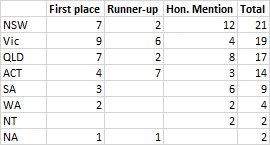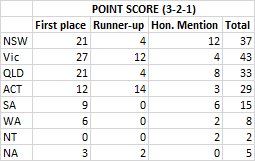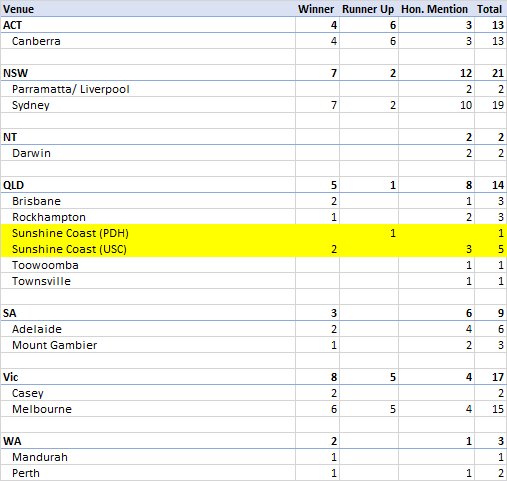This post is republished from
LinkedIn with the permission of the author, Anne-Marie Elias, who attended
PolicyHack as Champion and Facilitator for the
Incentives To Develop Social Enterprises stream.
The Policy Hack experiment was about challenging the way bureaucrats collaborate and encouraging them to engage with the innovation and entrepreneurship ecosystem to develop better policy and deliver better outcomes.
It was a brilliant exercise that demonstrated the capacity and appetite of entrepreneurs to come together with those from academia, corporates, capital, advisory firms, civil society and the tech and start-up sector to collaborate and develop innovative policy options for government.
PolicyHack had its fair share of critics. A number of blogs and articles appeared immediately prior to the event. They commented on the lack of planning and process, its haphazard development, its ‘exclusivity’ and the likelihood that it would produce no real outcomes in just one day.
In part they were right. However, in its defence, it was an experiment in innovation, pulled together quickly with no funds, a lot of goodwill, the generosity of a community and an enormous desire to show government that embracing the tools of innovation and entrepreneurship could deliver better outcomes. The Hack was well supported with mentors from
Disruptors Handbook and
Pollenizer and many others.
It was very brave of the Hon. Wyatt Roy MP ,
BlueChilli and
StartUpAus to take this on and push past the critics. Their chutzpah was rewarded. The energy was infectious with 150 participants, ten teams and champions -
60% of those women- generating 10 ideas in 6 hours.
Was it perfect? No. Is that a problem? No. We know how to make the next one better.
Innovation is never perfect and neither is the current approach to policy design.
Innovation is agile, it’s iterative, it’s responsive and above all else, it’s nimble. It doesn’t stand still while ever there is a problem to be solved.
Compare this hack philosophy to the current approach to policy development. This requires the development of an evidence base (by the time it is gathered it is often out of date), it draws input from the usual suspects, often involves expensive reports from well-paid consultants, has to pass the front page Daily Telegraph test to avoid upsetting vested interests and frankly as a result, often fails.
Is it any wonder then that so many programs cost what they do and deliver so little to the end user they were meant to serve?
I am a firm believer in supporting initiatives that disrupt the status quo for the better and was blown away by how well PolicyHack turned out.
PolicyHack was about demonstrating that there is a better way.


Champions 60% women
The Vision
Assistant Minister Roy spoke about the need for us to be diligent in our expenditure of public funds and observed
“We are going to be fearless and embrace the future. Help shape the vision for how our country can be a hub for entrepreneurship and Innovation."
Wyatt Roy, Assistant Minister, Innovation
The Assistant Minister made it clear that PolicyHack was an experiment that allowed us to collaborate. He explained that this was the first of many PolicyHacks.
Assistant Minister Roy left no one wondering about his aim to encourage all members of the innovation and entrepreneurship ecosystem to leverage our capital and support government to deliver better outcomes for our society and economy.
Who won?
These are both simple to implement immediately and can create our new generation of entrepreneurs in a relatively short time frame without any significant hit to the budget.
A quick diversion – the NDIS
The last time I got excited about policy was the
National Disability Insurance Scheme. I worked for the NSW Minister for Ageing and Disability, the Hon. Andrew Constance MP and he, like Wyatt Roy, was enthusiastic for change and drove an innovation agenda.
We co-designed the policy with people with disability and their carers.
Living Life My Way was a policy hack of sorts where government collaborated with service users and service providers. Where it didn’t meet expectations was that little actually happened after the ideas and exchange.
It ended up being a great big expensive exercise with good intentions but little change. A few years later the outcomes of the scheme remain underwhelming.
Last year in the
AFR, Laura Tingle highlighted the frustration with the burgeoning costs of the NDIS trial sites growing out of control. We hear that bureaucrats are hiring more consultants, commissioning more reports and there are concerns about how a scheme of this magnitude will be managed out of State and Territory governments in the next year or so.
Let’s deliver outcomes
In my humble opinion, the current set of bureaucrats working on the NDIS need to meet
Paul Shetler, CEO of the Digital Transformation Office (aka the PM's Tsar) and his team as well as
Pia Waugh of @AusGovCTO. They need to invite Paul and Pia to facilitate innovation dialogues to help the NDIS get back on track with the help of hackers from the innovation and entrepreneurship ecosystem. Hackers who will apply their smarts and collaborate in order to solve this wicked problem without needing to spend any more money.
If anyone is listening we need to hack for disability to see how we can stretch existing budgets to extract more and deliver better outcomes for people with disabilities, their families and carers.
A similar idea was generated last year by the
Cerebral Palsy Alliance (CPA) and
UTS called
Enabled by Design a design-a-thon bringing together people with disabilities and designers to hack practical solutions for accessibility, usability and desirability. We have some incredible minds in the innovation space that have done much for health and disability –
Prof Hung Nguyen and
Dr Jordan Nguyen are transforming health technology with their engineering, artificial intelligence and tech driven focus.
Delivering PolicyHack
StartUpAus will curate the content of the
OurSay platform and the hack and Assistant Minister Roy and his office will deliver packaged outcomes and suggestions to relevant agencies for consideration and action. Policy Hack is a brilliant initiative and with a bit more notice and planning we can make an enormous impact on any big spend issues and, I believe, bring more efficiency and innovation to government.
The PolicyHack model presents a powerful method that can solve a lot of wicked problems for government. PolicyHack can be the darling of Expenditure Review Committees and razor gangs because it gets bureaucrats thinking outcomes not just process. It gets them collaborating to make change not compromises and it delivers breakthrough ideas that solve problems and create opportunities. Which as we know sits at the heart of good policy.
What next?
The challenge now is what happens next?
Craig Thomler says
“the devil is in the delivery and while perfection should not be the enemy of trying, communication is key, transparency about the process, outcomes and community engagement is integral to the process.”
We haven’t nailed it yet. I think we need to invest some time in doing that. Coming together is the beginning. While we generated amazing ideas, I don’t know what will happen to these ideas post hack. Go to any of the hack sites and you see the promotion and maybe the winning ideas and teams but no further info beyond that.
My proposition
Here are four steps we can take to deliver an outcomes driven hack.
- Start with cross sector thought leadership groups to design the parameters and set the policy agenda.
- Align the right agencies (State and Commonwealth) with innovators in teams to co-design solutions.
- Set up a Post Hack Incubator so that the ideas can be further developed and piloted. These pilots must be supported both by government (through recalibrated funds and resources) and the innovation community.
- Keep talking to ensure all stakeholders remain engaged and informed by sharing the process, the results of implementation and the success or otherwise of outcomes.
We should be so lucky
I for one want to thank the Hon. Wyatt Roy, who, backed by the Prime Minister, the Cabinet Secretary
Senator the Hon. Arthur Sinodinos AO, the
Hon. Paul Fletcher MP Minister for Territories, Local Government and Major Projects and a growing number of Ministers, Members and Senators including (
Fiona Scott MP and
David Coleman MP) our champions of change, have seen the constellation of government, corporate and the innovation community align.
We need to deliver outcomes from PolicyHack and develop an ongoing program of hacks for change because it is time that we did things differently and moved into a new paradigm where collaboration is key and where we get shit done, because our communities, economy and ultimately, our future depends on it. If not us, then who? If not now, then when?
Anne-Marie Elias is a speaker and consultant in innovation and disruption for social change. She is an honorary Associate of the Centre for Local Government at UTS.
Anne-Marie has recently joined the Board of the Australian Open Knowledge Foundation.
















